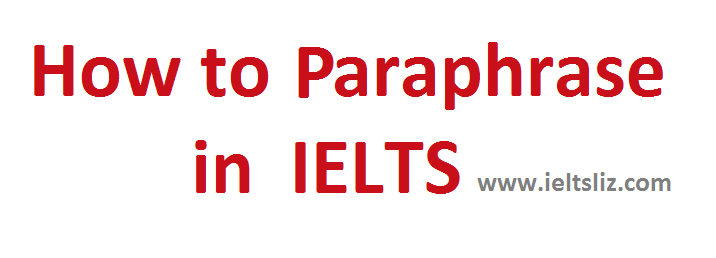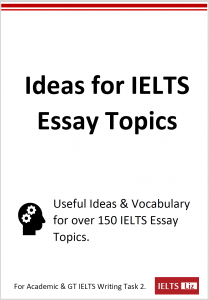Paraphrasing in IELTS is essential for a high score in IELTS. This page contains tips on paraphrasing to maximise your score. For IELTS Writing Task 2, paraphrasing is critical to your score for essay writing. Vocabulary counts for 25% of your writing marks. This page mainly focuses in paraphrasing for essays, but it can also help you understand more about paraphrasing in IELTS Reading and IELTS Listening. Certainly, it plays a role in the speaking, but to a lesser degree because repeated words are much more acceptable in the informal IELTS speaking test. So, lets review all about paraphrasing.
This page will review:
- using synonyms
- not changing all words
- avoiding mistakes
- changing word forms
- changing sentence structure
- paraphrasing and band scores
1. Using Synonyms
In IELTS one way to paraphrase is to use synonyms. This shows the examiner your range of vocabulary for any given topic. The wider your range of vocabulary, the higher your band score. BUT, only if you don’t make mistakes.
Here is an example of how a sentence can be re-written by using synonyms:
The reasons for increasing levels of pollution are the development of industry and air travel.
The sentence above can be paraphrased as:
The causes of rising levels of pollution are the growth and expansion of industry as well as the number of people travelling by air.
Here is a list of how the sentence was altered using synonyms.
- causes = reasons
- increasing = rising
- the development of = the growth and expansion of
- and = as well as
- air travel = travelling by air
Notice: you can see that the words “levels of pollution” and “industry” have not be changed. This is fine. Not all words need to be changed. In fact, the word “pollution” is best not changed. See tip number 2, below:
Problems with Synonyms
Synonyms are NOT words with 100% the same meaning and same usage. This is why so many people make mistakes with them.
Synonyms are words with a very similar meaning and might be perfect in some contexts but then not at all suitable in other contexts. So, using synonyms well is all about how deep your knowledge is of the word meaning and how the word is used – both in grammar and context.
The more mistakes you make with words, the lower your band score will be. See Tip 6 below.
2. Not All Words Need Changing
Not all words need to be changed for a high score in IELTS. You can see from the example above that some words have remained the same levels of pollution, industry , air). This means you need to decide which words to paraphrase and which words to keep the same.
High band score successful candidates (band 7 and over) know when to paraphrase and when to keep words the same.
People stuck at band 6 and below, often over-paraphrase. They try to change too many words too often which results in 1) poor word choices 2) changing the meaning and going off topic. Both problems will lower your score below band 7.
3. Avoiding Mistakes
The more mistakes you make with vocabulary in IELTS writing and speaking, the lower your score will be. Paraphrasing is a skill. Synonyms do not have exactly the same meaning and cannot always be used at the same time.
Watch this video below to get useful tips on paraphrasing for writing task 1 and writing task 2.
Mistakes with paraphrases cause people to get a low score and can also take people off topic in an IELTS essay.
4. Changing the Word Form
Another way to paraphrase sentences is to change the form of the word. This means we use the same words as IELTS but change their form. This type of paraphrasing is really focused at your writing skills because it means you don’t need to look for a synonym for a word, instead you can alter the word form.
Here is an example:
Many people are unhealthy because they fail to eat well and exercise.
This can be paraphrased by changing the word form of “unhealthy”, “fail” and “exercise”.
Many people have poor health as they are failing to eat well and are not exercising enough.
Lets look at the word changes for this paraphrase:
- Word forms
- unhealthy = poor health
- fail = are failing
- exercise = are exercising
- Linking word
- because = as
This is not low level paraphrasing, in IELTS this is considered skilful paraphrasing and it is actually a skill that you want to demonstrate. You need to show the examiner that you can alter word forms as a sign of flexibility with language.
So, don’t get stuck on always trying to find synonyms, you can just change the word form and still get a high score. It’s also a good way to avoid errors but taking risks with synonyms that are not perfect.
5. Changing Sentence Structure
Another way to paraphrase successfully is to change the order to words in a sentence. This means changing the structure of the sentence. Taking the example from above again:
Many people are unhealthy because they fail to eat well and exercise.
You can see above there are two clauses:
- Many people are unhealthy
- because they fail to eat well and exercise
We can change the order of the clauses:
Many people fail to eat well and exercise and for that reason they are unhealthy.
The clauses are now in a different order:
- people fail to eat well and exercise
- they are unhealthy
Let’s change this even more:
Failing to eat well and not exercising are the reasons that many people have poor health.
This is the best way to tackle paraphrasing in IELTS essays. The examiner will look for sentences that start with a gerund – a verb converted to a noun using +ing which makes the noun always singular.
If we use this approach and also add synonyms – it will look like this:
Failing to have a balanced diet and not getting enough physical exercise are the reasons behind the large number of people facing a range of health problems in society today.
Now we are approaching band 9 paraphrasing skills for IELTS writing task 2. Even a band 9 can keep some words the same – exercise = exercise.
If you enjoyed the example sentences above, you’ll love my Grammar E-book for Writing Task 2. It shows lots of ways to develop language and change sentence structures. See the link at the bottom of this page.
6. Paraphrasing & IELTS Band Scores
Of course paraphrasing will help your band score for the criterion of vocabulary. Below you see how your range of vocabulary affects your band score and also how the number of errors affects your score. Even if you have a wide range of vocabulary, your score will go down if you have too many errors. And if those errors impact your meaning, it will be below band 6.
Vocabulary Range
- Band 5 = minimum range
- Band 6 = adequate range
- Band 7 = sufficient range
- Band 8 – wide range
Number of Errors
- Band 5 = frequent errors & problems with meaning
- Band 6 = some errors, no problems with meaning
- Band 7 = few errors
- Band 8 = most sentences are error free
You can see that you need to show a range of words which means you need to paraphrase. But you also need to reduce your errors which means don’t try to paraphrase too much and don’t make mistakes.
Following the above tips (using synonyms, not paraphrasing all words, avoiding errors, changing the word form and changing the sentence structure) will help you achieve the highest score.
RECOMMENDED FOR YOU
- PARAPHRASING PRACTICE LESSONS
- Linking Words List for IELTS Essays
- Uncountable Nouns List
- Vocabulary Lists for Topics & Tips
- ALL MODEL ESSAYS & TIPS FOR WRITING TASK 2
- ALL READING PRACTICE LESSONS & TIPS
.



thanks for you work.
You’re welcome 🙂
Really enjoyed this. Very useful information. Thanks Liz
I’m glad it was helpful.
it has really be a blessing following your page.